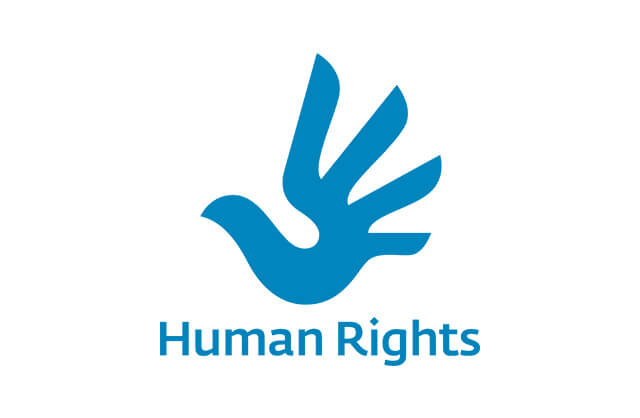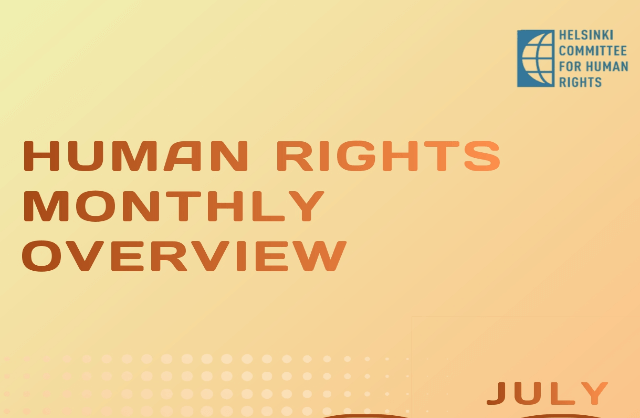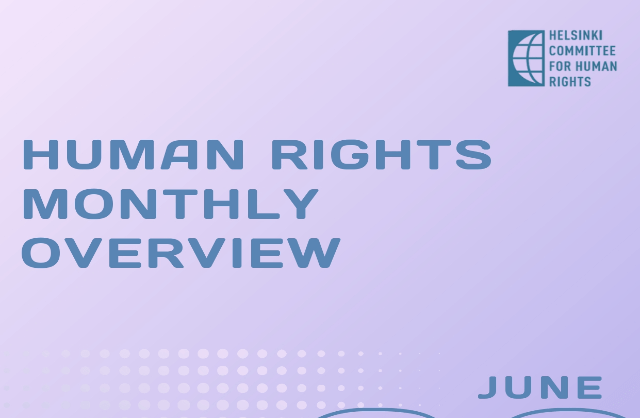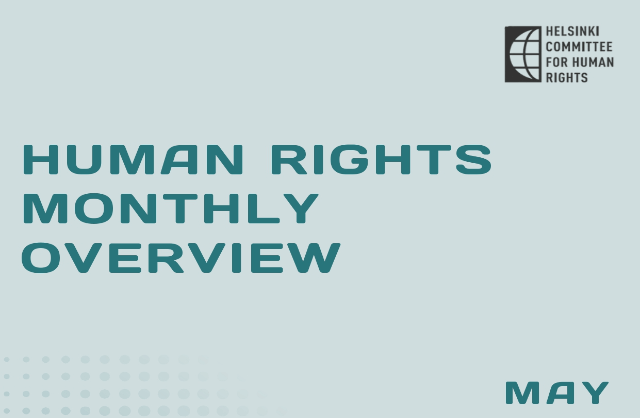Monthly report – February 2016
March 14, 2016

The Monthly report on the human rights situation in the Republic of Macedonia for February 2016 includes the following topics: -Institutions should not obstruct the work of the Special Public Prosecution; The Constitutional Court unauthorized for dissolving the Assembly; The Constitutional Court in defense of election crimes; Pre-election inflaming of ethnic and religious tensions.
INSTITUTIONS SHOULD NOT OBSTRUCT THE WORK OF THE SPECIAL PUBLIC PROSECUTION
On February 12th, 2016 the Special Public Prosecution informed the public via press conference that a criminal investigation was opened against several persons for the following crimes: Criminal association referring to Article 394 of the Criminal Code, Violation of the right to vote referring to Article 159 of the Criminal Code, Violation of freedom of voters referring to Article 160 of the Criminal Code, Bribery at elections and voting referring to Article 162 of the Criminal Code, Destruction of election material referring to Article 164 of the Criminal Code and Misuse of funds for financing the election campaign referring to Article 165 of the Criminal Code.
The Special Public Prosecution reported that in 2012, the suspects in the capacities of Minister of Interior, Minister of Transport and Communications and Secretary of the Government of R. Macedonia – all members of the Executive Committee of a political party, along with other currently unknown persons, had abused their influence and office, and for maintaining the dominance of the governing party on a local and national level, and especially for their immediate benefits from exercising power, they had created a group with the purpose of conducting criminal acts against elections and voting, which are punishable by law up to three years of prison or worse. Additionally, the Special Public Prosecution reported that an investigation against members of the Municipal Election Commission Chair was opened because there is reasonable doubt that they had committed the crime of electoral fraud, as well as an investigation against five judges of the Administrative Court in Skopje and four members of the State Election Commission 2013 for a crime – Abuse of power and authority under Article 353 of the criminal Code.
The following day, 13.02.2016, The Special Public Prosecution submitted two proposals for detention against the suspects in the Primary Court Skopje 1 Skopje, i.e. one proposal to the judge of a preliminary procedure in the Department of Organized Crime for 8 persons and another proposal to the judge of a preliminary procedure in the Department of Criminal Justice for adults. After having heard the suspects, the judge of the preliminary procedure in the Department of Organized Crime reached a decision which rejected proposals for detention, and which was then confirmed by the Criminal Council of the Primary Court Skopje 1 Skopje. A judge of the preliminary procedure in the Department of Criminal Justice for adults adopted a decision as a precautionary measure – Prohibition to approach or establish, i.e. maintain contacts or relations with certain persons, which was subsequently overturned by the Criminal Council by rejecting the proposal for a pre-trial detention as unfounded.
During this reported period, the Special Public Prosecution reported to be facing difficulties in cooperation with institutions, especially the Primary Court in Skopje 1 Skopje, the Cadastral Agency, the fifth administration in the Department of Security and Counterintelligence of Ministry of Interior, the witness protection unit of Ministry of Interior in Bitola, the Administrative Court, the primary Public Prosecutor in Skopje and prosecutors for organized crime and corruption, which prolongs the pre-investigation period. We believe that this attitude of certain institutions is unacceptable because it can lead to prevention of investigation and it disables the prosecutions’ procedures on persons for whom there is grounded suspicion to have committed serious crimes that threaten the constitutional order.
Recommendation: Institutions should cooperate with the Special Pubic Prosecutor and submit all necessary documents and information in order to enable an investigation against all the suspects and initiate appropriate criminal proceedings.
THE CONSTITUTIONAL COURT UNAUTHORIZED FOR DISSOLVING THE ASSEMBLY
After submission of initiatives by MPs Pavle Trajanov and Todor Petrov for assessing the constitutionality of the decision to dissolve the Assembly, the Constitutional Court was declared as unauthorized and this initiative was denied. The main points of the initiatives which contradicted the decision to dissolve the Parliament referred to the delayed implementation of the decision to dissolve the Assembly, i.e. whether there is legal and constitutional possibility for the Assembly to make deferred action decisions; whether after the decision to dissolve, parliamentarians can make laws and amendments; whether elections scheduled for April 24th are constitutional, because there are 61 days from the date when the decision to dissolve the Parliament enters into force (February 24th, 2016) to the date of the early elections (April 24th, 2016), which will exceed the legal timeframe for holding early elections after the dissolution of the Assembly, which is 60 days. At the public hearing of the Constitutional Court an emphasis was put on the question whether the Constitutional Court is competent or not to discuss this particular decision of the Assembly, whether this decision is an internal act of the Assembly, for which the Court has no jurisdiction, or it is a general act for which the Court, in accordance with the Regulations, has the jurisdiction to decide upon. Some of the constitutional judges, including judges Natasha Gaber Damjanovska, Gzime Starova, Sali Murati and Ishmael Darlishta believed that this decision of the Assembly is erga omnes and refers to the entire electorate, so the Constitutional Court is competent to debate. Furthermore, the Assembly cannot make decisions with deferred action, that this is an extension of the powers of the Assembly and that the elections cannot be held on April 24th, as they would be irregular and unconstitutional. The other constitutional judges argued that the Constitutional Court has no jurisdiction to decide on the specific legal act of the Assembly, which is not general act or law and believed that if the Constitutional Court gets involved in the decision for dissolving of the Assembly, it means that it can interfere with every decision the Assembly. After the ending of the public hearing, the Constitutional Court decided that it is not competent to rule on the disputed decision of the Assembly and declared itself incompetent.
Recommendation: The Helsinki Committee is deeply concerned about the interpretation of the Constitutional Court about the nature of the decision to dissolve the Assembly and characterize this decision as an internal act of the Assembly. The Helsinki Committee reacted sharply to the continued practice of the Constitutional Court to declare itself incompetent on matters for which according to the Constitution, the laws and rules of Court are in the scope of the Court, referring to an extremely important political and legal processes in the country.
THE CONSTITUTIONAL COURT IN DEFENSE OF ELECTION CRIMES
The Helsinki Committee for Human Rights of the Republic of Macedonia strongly reacted to the decision of the Constitutional Court to start proceedings for assessing the constitutionality of the Law for Amending the Law on Pardon ( “Official Gazette No.12 / 2009”). This decision is practically a prelude to what will happen, and it is suspension or revocation of the amendments to the Law on Pardons which stipulates that pardon cannot be granted to persons convicted of crimes against elections and upon which it is legal to establish the existence of the Commission for parole.
This legal decision was made to protect the public interest and the process of democratization and provide a greater legal security for citizens, as a fundamental value of the constitutional order of the Republic of Macedonia. Hence, it is symptomatic that the Constitutional Court decided today that there is a need for assessing the constitutionality of this law, especially given the fact that this initiative was filed at the beginning of February 2016, immediately after the opening of the case “Titanic” by the Special Public Prosecution, in which suspects for electoral fraud are former ministers Mile Janakieski and Gordana Jankulovska and other persons close to the governing coalition.
The expediency showed by the Constitutional Court in this case is a unique example of speediness in an effort, which transparently reveals its role as an instrument of defense of party interests of the governing coalition.
In this particular case it is surprising that the Government and the Assembly of RM have stated that the legal decision is in accordance with the Constitution, because the governing coalition was the one who proposed and voted in this law in 2009, in order to limit the authority of then-President of RM, who belonged to the ranks of the opposition. Rather, what is surprising is that in spite of such opinions, the Constitutional Court allows to be abused by the governing parties and bring an action for legal solution that can be interpreted in a positive direction, particularly in terms of elections.
Recommendation: The Helsinki Committee appeals to the Constitutional Court to rise above party and individual interests and make a decision that will not determine the unconstitutionality of the law and will not repeal it or invalidate it. Once again, we emphasize that this will not leave an option for persons convicted of electoral fraud to be pardoned, which would protect social and state interest and will provide clearance for rebuilding of the legal security and the rule of law as the fundamental values of the constitutional order of the Republic of Macedonia.
PRE-ELECTION INFLAMING OF ETHNIC AND RELIGIOUS TENSIONS
Ever since 2013, the Helsinki Committee has been registering crimes committed from hate or incidents motivated by intolerance or prejudice against members of a certain group in society on the web page www.zlostorstvaodomraza.mk. An increase in the number of such crimes was particularly noticeable before and during the Early Parliamentary Elections and Presidential Elections in 2014. In this period there were over 20 registered crimes committed because of different ethnic and political affiliation of the victims. Following the end of the elections, there was a sharp decline in offenses committed from hate.
During February 2016, i.e. three months before the scheduled Early Parliamentary Elections for this year, we have registered an increase in incidents which occurred because of ethnic or religious affiliation. During the month, there were twelve recorded incidents, ten of which were in Skopje, one in Tetovo and one near Gostivar. It is especially worrying that in eight incidents, minors are victims and perpetrators. The incidents took place in and around schools in Skopje (Skopje High School “Dimitar Vlahov”, Skopje High School “Lazar Tanev” and Skopje High School “Zef Ljush Marku”) on buses JSP Skopje (no. 19 and 65), but also in public places. Physical attacks were commonly performed by a group of perpetrators against a person. Offenders used cold weapons in attacks, and in one incident the victim was stabbed with a knife and a serious bodily injury was inflicted (punctured pleura).
At the end of the month, there was a major incident in which elements of inciting ethnic and religious hatred and intolerance were noticed. It was about the initiative of the World Macedonian Congress (WMC) for setting up a 51-meter cross on a roundabouts in the municipality of Butel. This initiative came after follows after the establishemnt of two-headed eagle monument in Cair Municipality – a tribute to the National Liberation Army (UCK), supported by the political party Democratic Union for Integration (DUI). On February 27th, a group of citizens gathered to mark the beginning of the building activities on the location meant for the cross, the President of SMK, Todor Petrov was attacked and injured by a group of citizens from the Albanian community in Macedonia, including member of the political party DUI. Todor Petrov was visited in the hospital by former Prime Minister Nikola Gruevski and the Mayor of Skopje Koce Trajanovski. A smaller group of citizens in early March camped as a sign of protest, and a group of counter-protesters joined them for one day. During the protests, the foundations of the cross were damaged, there was a confrontation between the two groups (by throwing stones and bottles) and three police officers were wounded.
Recommendation: The parties of the governing majority VMRO-DPMNE and DUI, instead of protesting against their own initiatives for building monuments which only lead to inciting ethnic and religious hatred and intolerance, should focus on promoting ethnic understanding, tolerance and coexistence.


